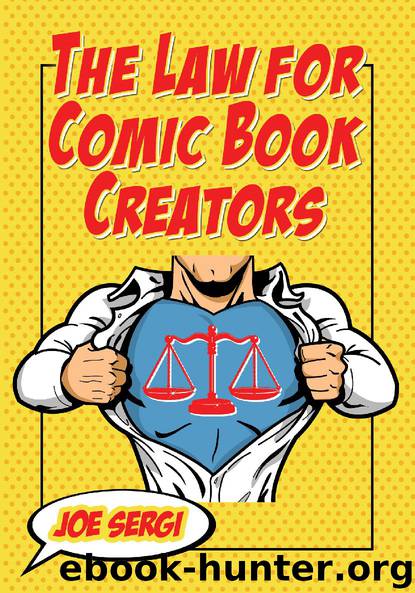The Law for Comic Book Creators: Essential Concepts and Applications by Sergi Joe

Author:Sergi, Joe
Language: eng
Format: epub
Publisher: McFarland
Published: 2015-03-30T22:00:00+00:00
Blade Kills at the Box Office but Not for Marvel Comics
At the same time as Lee was forming and working with Stan Lee Media, Marvel Comics continued its attempts to create a viable film license. Their first attempt resulted in Howard the Duck in 1986, a critical and commercial failure. However, things turned around in 1998, with the release of Blade, starring Wesley Snipes as the title character. Blade was loosely based on the Marvel Comics character created by Marv Wolfman for the Tomb of Dracula series.13 In the film, a half-vampire who can walk in daylight protects the human race from evil vampires. The movie spawned two sequels (Blade II and Blade Trinity) as well as a television series (Blade: The Series). However, despite the fact that Blade grossed over $70 million and had an estimated budget of only $45 million, Marvel Comics did not receive any of these profits as a result of the profit-participation provision of the production agreement.
The court explained how this was possible:
This profit-participation provision, which Marvel has characterized as a “Hollywood accounting” provision, entitled Marvel to a share of Blade’s “net profits,” as that term was defined by the language of the production agreement. Marvel’s [representative] stated that “Hollywood accounting” can be interpreted “to mean that you will never see anything—you will never see—the company would not see any revenues from the studio….” Marvel’s chief creative officer, Avi Arad, testified that “Hollywood accounting is—is the term used to—studios deduct everything possible out of film revenues, from cost of the movie to getting a star flowers to—you name it and it’s in there. And it’s expensive and it’s hard to monitor, and therefore I’m allergic to it.”
The court further explained Hollywood accounting in a footnote:
1. One commentator has provided the following description of the typical provisions of a “Hollywood accounting” deal: [T]he basic net profits formula subtracts from the studio’s (distributor’s) adjusted gross receipts the production costs, distribution expenses, and distribution fees…. Production costs are all costs directly attributed to the particular film (plus overhead). Production costs include the payments to all other participants in a film including the contingent compensation of gross participants. So, for example, [if a given actor] had fifteen gross points for [a given movie] (that is, he received 15 percent of the gross receipts), every dollar of revenue that the film generated pushed the net profits breakeven point back fifteen cents. Thus, if a film has significant gross participants, the breakeven point quickly recedes. Almost all the box office smashes that failed to produce net profits had significant gross participants.
Download
This site does not store any files on its server. We only index and link to content provided by other sites. Please contact the content providers to delete copyright contents if any and email us, we'll remove relevant links or contents immediately.
| Books & Reading | Comparative Literature |
| Criticism & Theory | Genres & Styles |
| Movements & Periods | Reference |
| Regional & Cultural | Women Authors |
4 3 2 1: A Novel by Paul Auster(12362)
The handmaid's tale by Margaret Atwood(7747)
Giovanni's Room by James Baldwin(7313)
Asking the Right Questions: A Guide to Critical Thinking by M. Neil Browne & Stuart M. Keeley(5751)
Big Magic: Creative Living Beyond Fear by Elizabeth Gilbert(5742)
Ego Is the Enemy by Ryan Holiday(5406)
The Body: A Guide for Occupants by Bill Bryson(5070)
On Writing A Memoir of the Craft by Stephen King(4924)
Ken Follett - World without end by Ken Follett(4715)
Adulting by Kelly Williams Brown(4560)
Bluets by Maggie Nelson(4541)
Eat That Frog! by Brian Tracy(4509)
Guilty Pleasures by Laurell K Hamilton(4435)
The Poetry of Pablo Neruda by Pablo Neruda(4087)
Alive: The Story of the Andes Survivors by Piers Paul Read(4014)
White Noise - A Novel by Don DeLillo(3999)
Fingerprints of the Gods by Graham Hancock(3983)
The Book of Joy by Dalai Lama(3965)
The Bookshop by Penelope Fitzgerald(3839)
